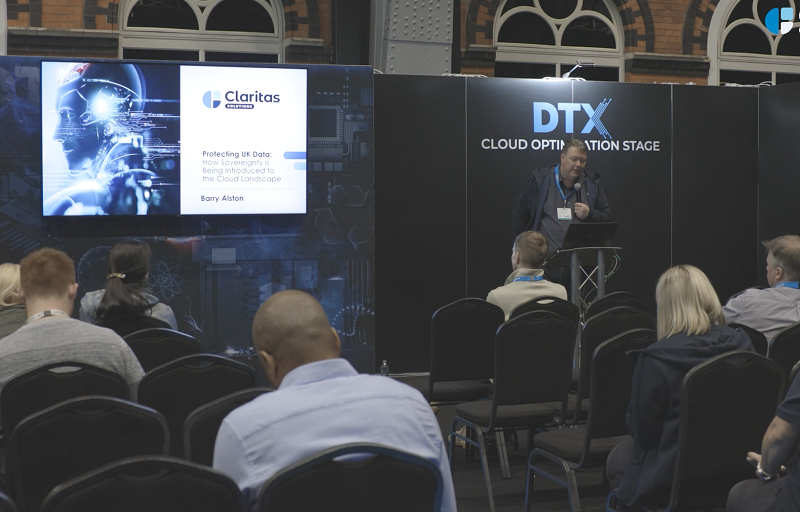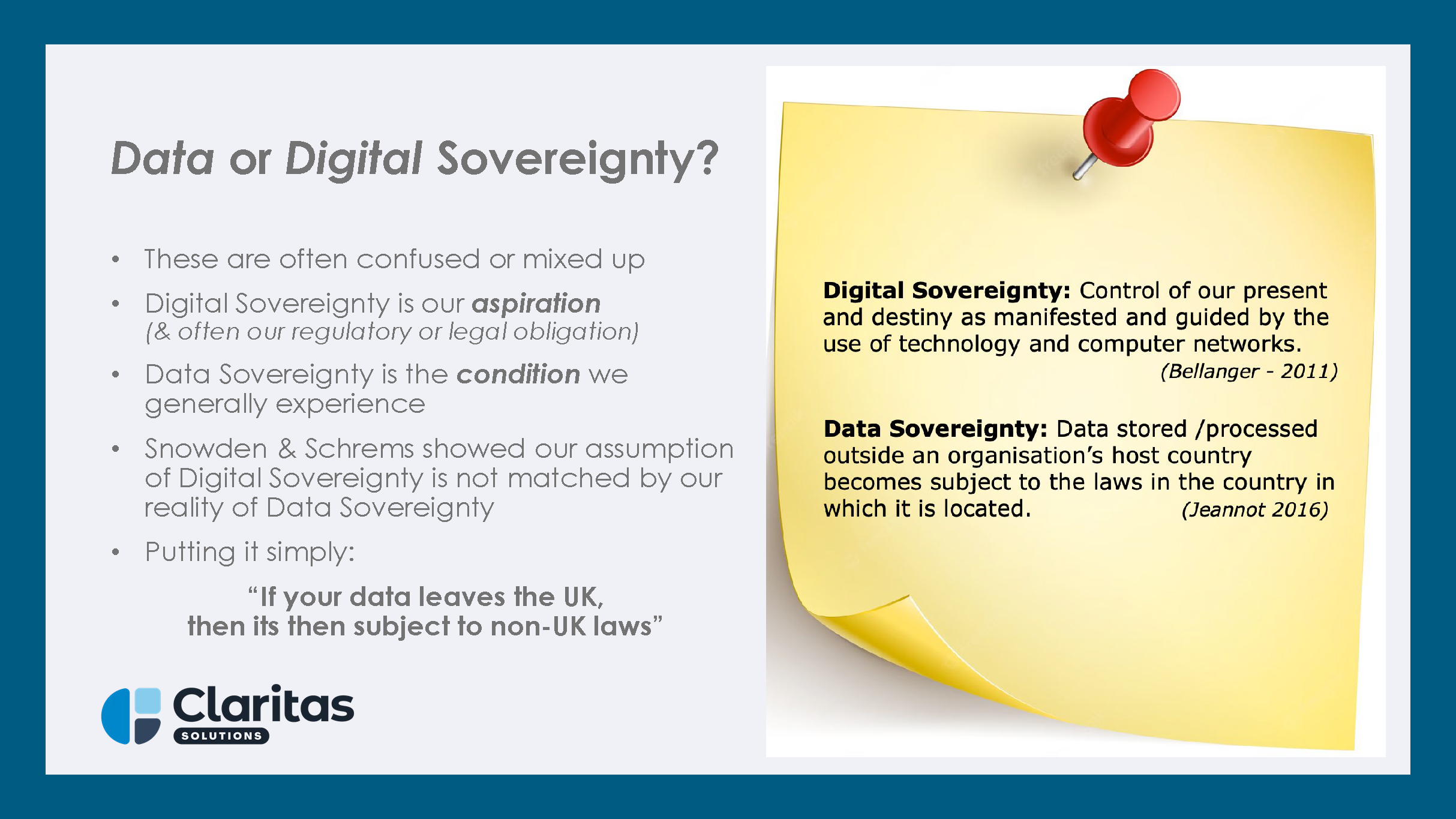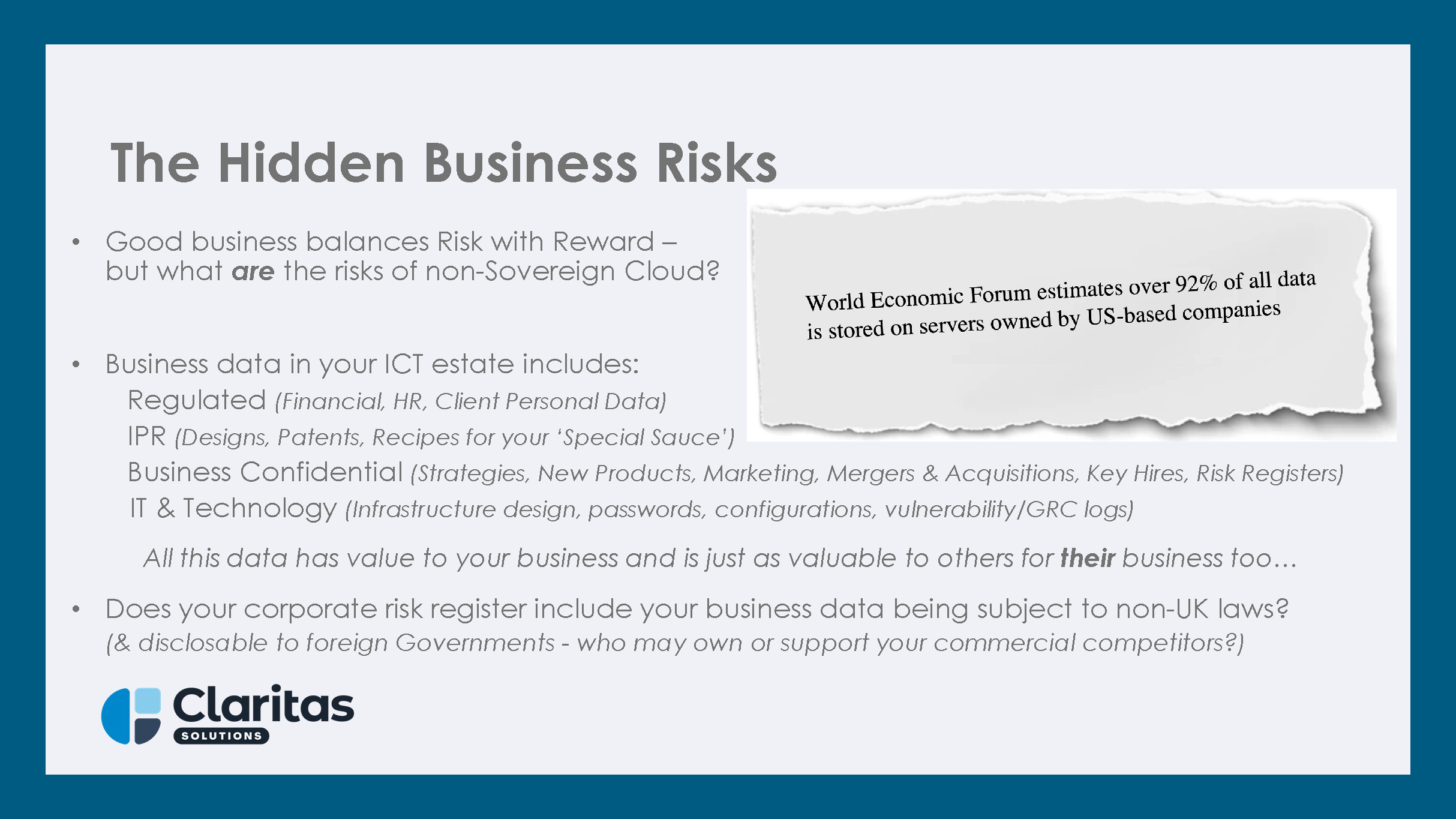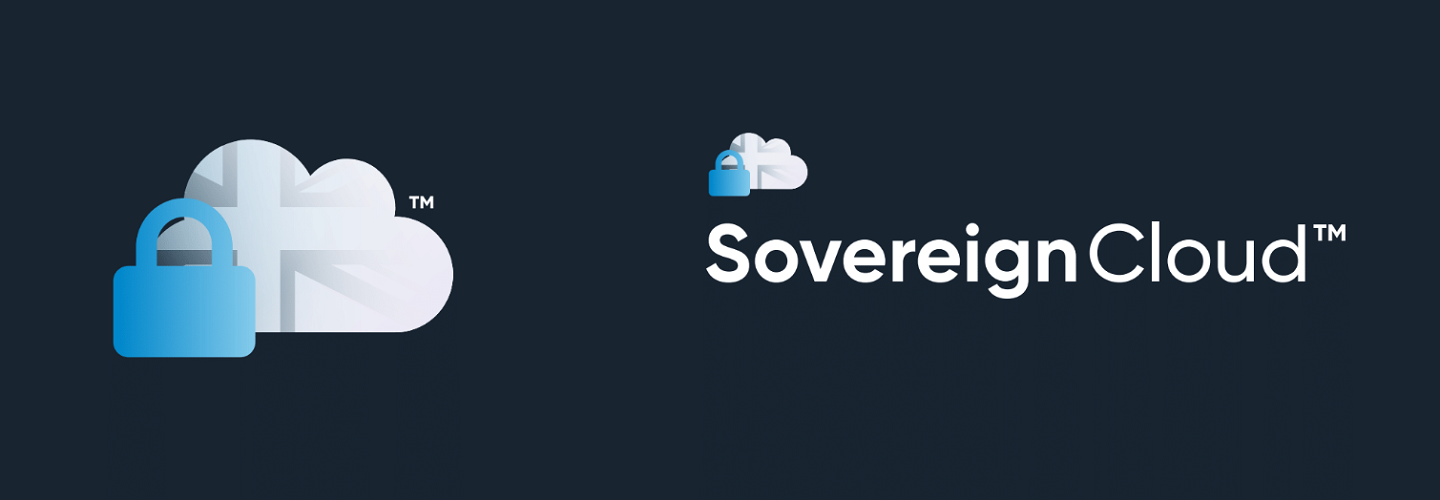
Summary
- We need to think where our data is and who potentially has access to it
- ‘In country’ means we have control over the laws and regulations that are applied to the data
- Promoting data sovereignty and reducing reliance on non-sovereign cloud providers.
- Are we failing to recognise long term goals over quick wins?
In our interconnected world, where we have allowed our data to flow freely, the concept of data sovereignty has become lost in the noise and glitzy of “simplicity”, run this service up here, attaching into this application, Oh look a new service has been bundled in. But in that fast adoption have we considered “where our data is and who potentially has access to it? Also are we keeping in line with legislative requirements?” These aspects become lost in the determination to move forward. But should we not be more concerned with protecting our data? We all know that along with our people it is our most valuable asset. We’ve let it out and we need to be thinking about bringing it back home.

So, what does it mean to be truly sovereign with your data? In a digital landscape where data has become the lifeblood of all we do, maintaining control and ownership over that data is crucial.
In order to be truly Sovereign we have to be in control of three aspects:
-
its STORAGE, needs to be onshore at all times.
-
PROCESSING, in its movement to we have complete confidence that it never leaves the UK, that it never transits through to another country as part of the background processes of the hosting provider.
-
And finally SUPPORT SYSTEMs and teams are all located within the UK.
By keeping the data ‘In country’, it means we have control over the laws and regulations that are applied to the data.
By keeping data “in country,” we safeguard our companies sensitive information, intellectual property, and trade secrets lowering the risk of unauthorised access or potential breaches. Data sovereignty ensures that organisations have the autonomy to make strategic decisions based on their unique local context, rather than being subject to external influences. In this I’m referring to the difficulties that some companies have experienced with the removal of data from some service being cost prohibitive. To make it work it does require that we establish the right foundations for the governance. This involves implementing robust policies and practices that prioritise trust, privacy, ethics, and accountability in the control of your data.
Trust is fundamental in a data-driven world, as customers, partners, and stakeholders need to have confidence that their data is being handled responsibly. Protection of privacy is paramount, requiring companies to implement appropriate measures to secure personal and sensitive information, to make sure that we safeguard individuals’ rights and complying with relevant laws and regulations.
Ethics also play a pivotal role. as we leverage data to gain insights and make informed decisions, it is crucial to ensure that ethical considerations guide these processes. This involves employing responsible data collection and usage practices, avoiding bias, and safeguarding against discrimination. Accountability is equally vital, as organisations must take responsibility for their data handling practices, establish clear lines of responsibility, and provide transparency to stakeholders.
Governance
Effective governance is essential, navigating the landscape of compliance can be complex. We must be diligent in meeting all our data protection and regulatory requirements. This includes understanding the legal frameworks and industry-specific regulations applicable to your operations.
To meet our data protection and regulatory requirements, we need to be proactive in our approach. There is a need to stay informed about evolving legislation and emerging best practices, engage legal and compliance experts to guide their efforts, and prioritise ongoing education and training for employees to promote a culture of compliance.
Now that all may seem a little like a sideline but it’s to demonstrate one really important point. In a world where your data is Sovereign. You have one compliance base to worry about and consider.
In a world where your data is not Sovereign and flowing freely around the globe, how many different legal frameworks do you have to be aware of and be prepared to work under?
Everywhere your data lands could provide you with a different challenge. How big is your legal department? What’s their knowledge of international data laws like? If it’s stored there or processes there, you are subject to those local laws. Will legal ever want to talk to you again?

Early Days
In the early days of cloud computing, companies in the UK, like many others around the world, started seeing the benefits of leveraging cloud services. In response to the demand for sovereign cloud services, various initiatives and partnerships emerged in the UK. For example, the UK government launched the Crown Hosting Data Centres in 2015, providing a secure and resilient data centre environment for public sector organisations. This initiative aimed to ensure that sensitive government data remained within the UK, promoting data sovereignty and reducing reliance on non-sovereign cloud providers.
And that was the UK government planned response to put in place a Sovereign cloud for UK PLC, what they were looking to build was shaping up to be something special, departments worked together to define what good looked like and it was even classed as world leading by the European Union agency for Cybersecurity.
We then threw it to the market, with the premise of “WE LET THE MARKET DECIDE”.
And of course, the large Cloud computing providers offered cost savings, scalability, and flexibility, almost Walmart style stack it high sell it cheap. On the face of it, allowing us as IT leaders to focus on our core competencies while relying on external providers for our IT infrastructure and services. It packaged costs into easy boxes, that could make us and our budget lines look good.
We need to realise that the cloud does not mean hyperscaler multinational. Are we failing to recognise long term goals over quick wins? We used to be a manufacturing country, but now we have become consumers not makers. We need to redress the widening imbalance between us and the rest of the world. one-off investment is not the answer. There ARE cloud facilities in the UK. We as IT leaders need to decide where we want our expertise and intelligence to sit, not just for now but for the future and make conscious decisions about who potentially has access to our data

New UK Sovereign Cloud Platform
Our new UK Sovereign Cloud platform which will ensure that your data is protected and kept sovereign complete with all the relevant assurances.
Get in touch with our sales team today!
Email- sales@claritas-solutions.co.uk
Phone- 0330 333 88 33
Or complete the online contact form




